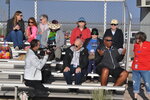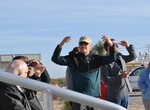

A moment of silence Monday, May 1, was unintentional as family members watched a space-bound rocket take off only to fizzle in a fiery flash and return to ground almost immediately at the Spaceport America vertical launch area.
The people sitting on the stations at the spaceport were there to watch the ashes of their loved ones blast into space as part of the Celestis Memorial Spaceflights’ Earth Rise Service. The Aurora Flight, contracted with UP Aerospace’s NASA flight, would have blasted the 120 capsules holding a few grams of ashes each into space and returned to earth, onto the White Sands Missile Range, to be collected and returned to the families.
Those watching had invested to send husbands, fathers and friends to space including everything from physicists to science fiction lovers and fantasy gamers.
“This is our 10th mission here at the spaceport and the 20th overall mission,” said Celestis Co-Founder and CEO, Charles “Charlie” M. Chafer before the failed takeoff. “You are at the very tip of the rocket so your loved ones will get to space before anybody else.”
But the May 1 glitch at takeoff was a very rare one. UP Aerospace has conducted more than 15 successful missions out of Spaceport America since 2006. The passed away passengers of the flight will be launching on the next available Earth Rise Mission, named Perseverance.
“We have full confidence that UP Aerospace will find and fix the problem and we look forward to flying again with them when they are ready,” Chafer said.
The UP Aerospace flight was also carrying 13 payloads from NASA’s TechRise Student Challenge, according to a NASA press release. The flight “had an issue during an attempted launch out of Spaceport America in New Mexico, confirmed by launch provider UP Aerospace,” the release said.
NASA's TechRise Student Challenge invites teams of sixth to 12th-grade students to design, build, and launch science and technology experiments on commercial suborbital vehicles. Thirteen of 117 total payloads selected as part of TechRise challenges were aboard this flight. NASA will work with TechRise Challenge administrator Future Engineers, UP Aerospace, and the affected student payloads to determine potential paths forward.
"NASA has been a strong supporter of commercial suborbital spaceflight for over a decade,” said Christopher Baker, program executive for the Flight Opportunities program in NASA’s Space Technology Mission Directorate at the agency’s headquarters in Washington in the release. “Despite the collective experience of the industry, today is another reminder of the many things that must go right on any spaceflight.
"While this is obviously a disappointing outcome for today’s flight, that should not diminish the work it took to get here. Each of these TechRise student teams should be proud of their accomplishment in delivering an experiment for launch and we will be working on future opportunities for them to see their experiments in space.”
The four future flights carrying the remaining TechRise student payloads are not impacted by this event and will fly as expected.